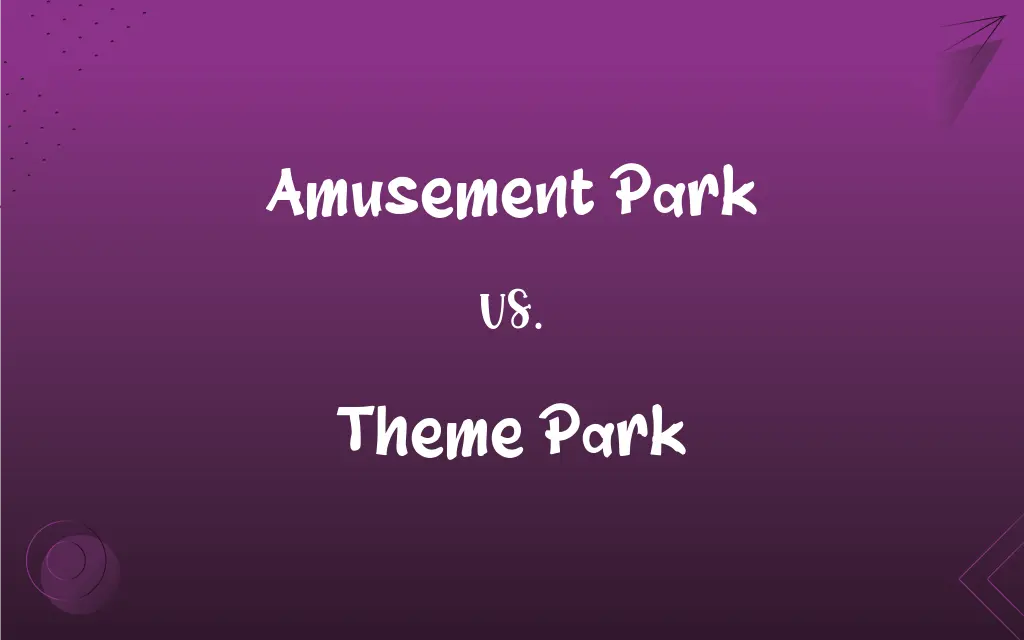Amusement Park vs. Theme Park: What's the Difference?
Edited by Aimie Carlson || By Harlon Moss || Published on March 4, 2024
An amusement park is a park with various attractions, such as rides and games, while a theme park is a type of amusement park designed around a central theme, such as a historical setting or fictional world.

Key Differences
Amusement parks and theme parks both offer entertainment through rides, games, and attractions. However, amusement parks focus on providing a variety of attractions without a unifying theme. In contrast, theme parks are designed around a specific theme or set of themes, with attractions, rides, and entertainment that all relate to this central concept.
Amusement parks often have a wide range of rides, from roller coasters to Ferris wheels, without any particular theme connecting them. Theme parks, on the other hand, create an immersive experience, with every aspect of the park, from the architecture to the food, contributing to the overall theme.
One key difference between amusement parks and theme parks is the level of detail and storytelling involved. Theme parks often go to great lengths to create a narrative or backstory for their attractions, while amusement parks typically focus more on the thrill of the rides themselves.
Amusement parks are generally more focused on providing a variety of fun and exciting experiences, while theme parks aim to transport visitors to another place or time, offering a more immersive and cohesive experience. This distinction can impact the overall atmosphere of the park and the type of experiences visitors can expect.
Both amusement parks and theme parks offer entertainment and attractions, the key difference lies in the presence and execution of a unifying theme in theme parks, which influences the design, attractions, and overall experience offered to visitors.
ADVERTISEMENT
Comparison Chart
Focus
Variety of rides and attractions
Immersive experience based on a central theme
Design
No specific theme, more emphasis on thrill rides
Themed environments, detailed storytelling
Attractions
Wide range of rides without a unifying theme
Attractions and rides that align with the park's theme
Experience
Focus on fun and excitement
Focus on storytelling and immersion
Examples
Coney Island, Six Flags
Disneyland, Universal Studios
ADVERTISEMENT
Amusement Park and Theme Park Definitions
Amusement Park
A place designed for entertainment, often featuring rides, games, and food stalls.
The amusement park was bustling with families enjoying the sunny weather and exciting rides.
Theme Park
A type of amusement park where the entire environment is themed to enhance the visitor's experience.
The theme park's pirate-themed area included a shipwreck ride and treasure hunt games.
Amusement Park
A recreational area with a variety of attractions, including thrill rides and games.
The kids couldn't wait to visit the amusement park and try out the new roller coaster.
Theme Park
An amusement park with a cohesive theme that ties together all attractions, rides, and entertainment.
The theme park's futuristic zone offered a glimpse into what life might be like in the year 3000.
Amusement Park
A destination for fun and amusement, often featuring a mix of rides, shows, and activities.
Our trip to the amusement park was filled with laughter, screams of excitement, and unforgettable memories.
Theme Park
A park with attractions and rides based on a particular theme or story.
The theme park's new superhero area was a hit, with rides and shows featuring our favorite characters.
Amusement Park
An outdoor area with attractions for leisure and enjoyment.
The amusement park's Ferris wheel offered a stunning view of the city skyline.
Theme Park
An amusement park designed around a specific theme, offering immersive experiences.
The theme park's medieval section transported us back in time with its castles and knights.
Amusement Park
A park offering various attractions, such as rides and games.
We spent the day at the amusement park, riding roller coasters and playing carnival games.
Theme Park
An entertainment complex where the attractions are centered around a unifying theme.
The theme park's attention to detail in its fantasy land was impressive, making us feel like we were in a magical world.
FAQs
How do amusement parks differ from theme parks?
Amusement parks focus on providing a variety of attractions without a unifying theme, while theme parks are centered around a specific theme, with all attractions and entertainment related to that theme.
What is an amusement park?
An amusement park is a park that features various attractions, such as rides, games, and entertainment, designed for the enjoyment of its visitors.
What makes theme parks unique compared to amusement parks?
Theme parks are unique because they offer an immersive experience based on a specific theme, with detailed environments and attractions that align with that theme.
What are some examples of amusement parks?
Examples of amusement parks include Six Flags, Cedar Point, and Coney Island.
What is the importance of theming in a theme park?
Theming is crucial in a theme park as it creates a cohesive and immersive environment that enhances the visitor's experience and differentiates the park from traditional amusement parks.
Can a theme park also be an amusement park?
Yes, a theme park is a specific type of amusement park that has a central theme guiding its design and attractions.
What is a theme park?
A theme park is a type of amusement park that is designed around a specific theme or set of themes, with attractions and entertainment that are related to that theme.
What are typical attractions found in amusement parks?
Typical attractions in amusement parks include roller coasters, Ferris wheels, bumper cars, and arcade games.
Can amusement parks have themes without being considered theme parks?
Yes, amusement parks can have themed areas or rides, but they are not considered theme parks unless the entire park is designed around a cohesive theme.
How do seasonal events affect amusement parks and theme parks?
Seasonal events, such as Halloween or Christmas celebrations, can attract additional visitors and provide unique experiences, often with special decorations and themed attractions.
Are water parks considered amusement parks or theme parks?
Water parks can be considered a type of amusement park, and they can also be themed, making them a subtype of theme parks.
How do amusement parks and theme parks cater to different audiences?
Amusement parks cater to a wide audience seeking thrill rides and entertainment, while theme parks target visitors looking for immersive experiences based on a particular theme or story.
What is the role of entertainment in amusement parks and theme parks?
Entertainment, such as shows, parades, and character meet-and-greets, plays a significant role in both types of parks, adding to the overall enjoyment and experience of visitors.
What safety measures are common in amusement parks and theme parks?
Common safety measures include ride inspections, safety harnesses, height requirements, and trained staff to ensure the well-being of visitors.
How do amusement parks and theme parks evolve with technology?
Parks evolve with technology by incorporating advanced ride systems, virtual reality experiences, and mobile apps for navigation and ticketing to enhance visitor experiences.
How do amusement parks and theme parks appeal to a global audience?
These parks appeal to a global audience by offering a wide range of attractions, catering to diverse tastes, and sometimes incorporating cultural elements into their themes and entertainment.
What are some examples of theme parks?
Examples of theme parks include Disneyland, Universal Studios, and Legoland.
What role do rides play in amusement parks and theme parks?
In amusement parks, rides are the main attraction, focusing on thrills and excitement. In theme parks, rides are often designed to fit the theme, enhancing the overall experience.
How do amusement parks and theme parks contribute to local economies?
Both types of parks contribute to local economies by attracting tourists, creating jobs, and generating revenue through ticket sales, merchandise, and food and beverage sales.
What are the challenges faced by amusement parks and theme parks?
Challenges include maintaining safety standards, managing crowds, keeping attractions fresh and appealing, and dealing with weather-related closures.
About Author
Written by
Harlon MossHarlon is a seasoned quality moderator and accomplished content writer for Difference Wiki. An alumnus of the prestigious University of California, he earned his degree in Computer Science. Leveraging his academic background, Harlon brings a meticulous and informed perspective to his work, ensuring content accuracy and excellence.
Edited by
Aimie CarlsonAimie Carlson, holding a master's degree in English literature, is a fervent English language enthusiast. She lends her writing talents to Difference Wiki, a prominent website that specializes in comparisons, offering readers insightful analyses that both captivate and inform.































































